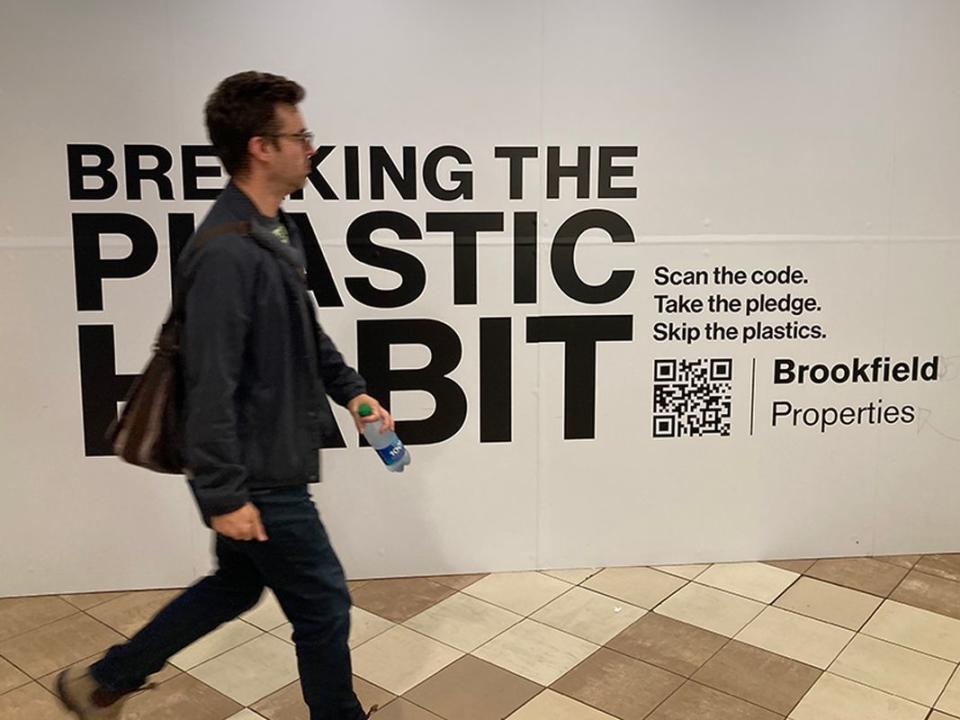Terence Corcoran: ‘Woke’ ESG regulations leading to policy chaos with worst yet to come

In an underground retail passage leading to the Toronto subway at the intersection of Bloor and Yonge — a retail row owned by Brookfield Properties — many of the stores sit in post-COVID shutdown. To fill some of the empty window space, Brookfield has erected a billboard. Instead of erecting a “For Lease” sign, the billboard calls on subway passengers to join in “BREAKING THE PLASTIC HABIT.”
Commuters are asked to scan a QR code so they can promise to “Skip the plastics.” The scan opens on a page that says “Take the pledge!” by ticking a box that says “I pledge to Break the Plastic Habit” and another that says “My workplace pledges to Break the Plastic Habit.”
How cheap and easy it must be for a global real estate company to take public shots at the plastics industry, especially for a company like Brookfield Properties, a subsidiary of Brookfield Asset Management, which is chaired by Mark Carney, former central banker and leading global proponent of corporate adherence to strict environmental, social and governance (ESG) practices.
Plastics have been a Blookfield ESG target for years. Along with the world’s biggest asset managers and corporations, from such trillion-dollar giants as BlackRock to Canada’s major banks and down to airlines and Liberty Gold, a 30-cent-a-share mining company, the investment world has been churning out millions of pages of feel-good reports on how they are managing their way through a labyrinth of often unmeasurable aspects of their operations.
That easy PR part of ESG, labelled as “woke” by some and “greenwashing” by others, is coming to an end. Even BlackRock CEO Larry Fink seems to be turning his back on the ESG crusade. A Google news search of ESG produces a rundown of stories: the end of ESG boom; ESG blocks investment flows; institutions struggle with ESG metrics.
That struggle is set to turn into a regulatory nightmare as governments, financial houses, corporations and regulators attempt to create international standards to document and measure business operations that are largely unmeasurable.
The ESG regulatory hurricane is sweeping across Europe, North America and Asia. The U.S. Securities and Exchange Commission issued new ESG disclosure guidelines in July that would require domestic and foreign registrants to report climate-related information.
Many corporations already do some of this, but coming soon is the need to document what is called “Scope 3” carbon emissions. In short, corporations will soon be forced to report not only on their direct carbon emissions but on “all indirect emissions … that occur in the value chain of the reporting company, including both upstream and downstream emissions.”
Scope 3 emissions targets are a product of the Greenhouse Gas Protocol Corporate Standards (GGPCS) regime, which is only one small aspect of an alphabet soup of rules that’s about to drown corporate managers and investors. There’s no space here to attempt to explore the whole global scene, even if I did understand it, but a good starting point is to look at the growth of regulatory acronyms.
ISSB: The International Sustainability Standards Board is developing standards “in the public interest” to install a high-quality, comprehensive global baseline of sustainability disclosures focused on the needs of investors and the financial markets. A key ISSB player is Richard Manley, the Canada Pension Plan Investment Board’s chief sustainability officer. He heads the ISSB’s investor advisory group.
CSRD: The Corporate Sustainability Reporting Directive requires Europe’s companies to report on the impact of corporate activities on the environment and society, and requires a fully audited assurance of reported information.
ESRS: European Sustainability Reporting Standards were adopted July 31 and require reporting on sustainability-related impacts, opportunities and risks under the CSRD. These include a full range of environmental, social and governance issues, including climate change, pollution, biodiversity, ecosystems and resource use. Workforce human rights reports include a company’s own workforce (social protection, persons with disabilities, work-related ill-health, and work-life balance). All these datapoints are included in ESRS.
Opinion: Reducing emissions will cost. Governments need to admit that
Terence Corcoran: De-zone Ontario’s Greentrap and free up Toronto
William Watson: Back off, premiers, and let the Bank of Canada do its job
ESG is a massive regulatory and corporate reform nicely described by Stuart Kirk, a former HSBC responsible investing executive, as “death by fatuous and incomparable data.”
One thing is certain about ESG regulatory reform: Taking the Brookfield Plastics Pledge was the easy part. The worst is yet to come.
• Email: tcorcoran@postmedia.com

 Yahoo Finance
Yahoo Finance 